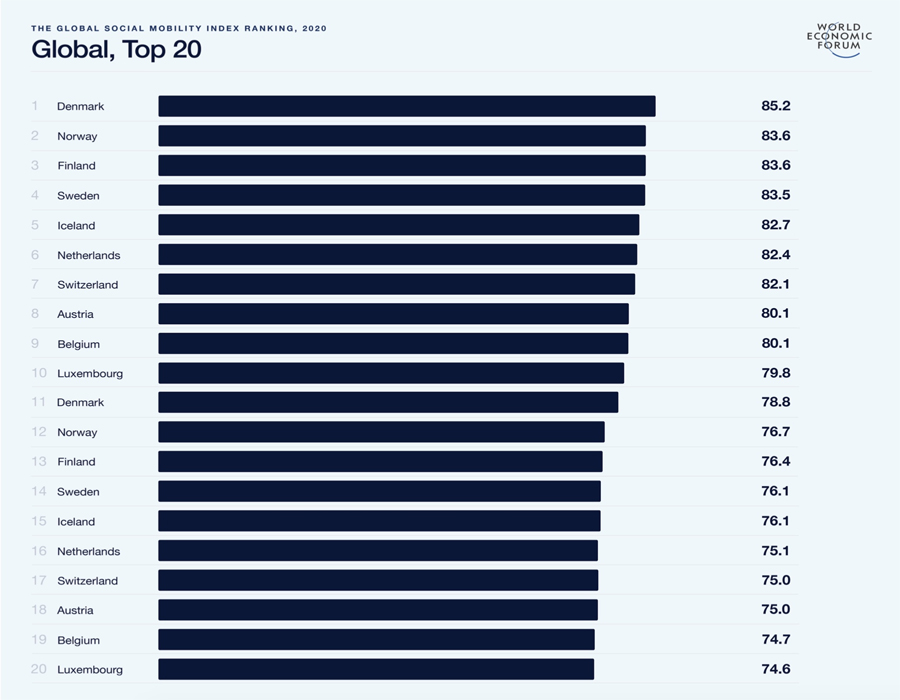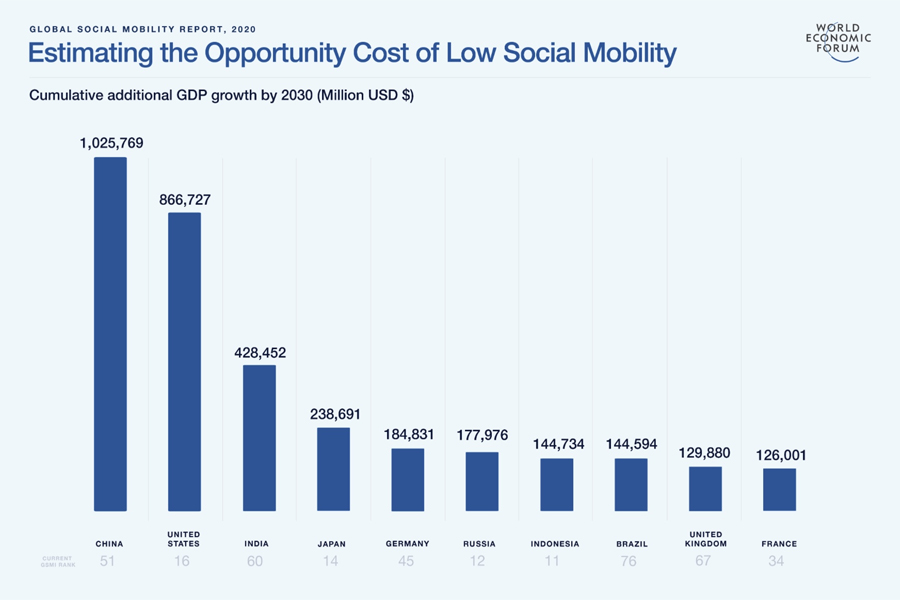Economies have much to gain by reducing inequality, and businesses must take the lead to help fix it, according to the World Economic Forum’s (WEF) Social Mobility Report 2020, published today. After all, creating societies where everyone has the same opportunity to fulfil their potential in life, irrespective of socioeconomic background, would boost economic growth by hundreds of billions of dollars a year, says WEF.
Increasing social mobility, a key driver of income equality, by just 10% would not only benefit social cohesion, but also boost economic growth by almost 5% by 2030, the report reveals. It would also bring huge societal benefits in the form of reduced inequalities, as well as healthier and more fulfilled lives. Yet most economies are failing to provide the conditions in which their citizens can thrive, ‘often by a large margin’, confirms WEF.
Businesses, however, can help to reduce inequality, according to the report published for WEF’s Platform for Shaping the Future of the New Economy and Society. Together with business and academic organisations, the platform is aiming to integrate equality and inclusion into the new economy with improved education, skills, jobs and economic opportunities by 2030 for one billion people worldwide.
PURPOSE OVER PROFITS
WEF’s report suggests that businesses can help reduce inequalities by promoting a culture of meritocracy in hiring, providing vocational education, reskilling and upskilling, as well paying fair wages. It also recommends industry and sector-specific plans to address historic inequalities within and between sectors.
According to WEF, companies that place purpose over profits perform better in the long term. By helping to make societies more equitable, consumer bases grow, operating environments become more stable and there is greater trust between customers and stakeholders. Furthermore, paying fair wages and eliminating the gender pay gap will also boost social mobility.
“While social mobility requires a new set of public investments, it is the mix and quality of investments that will make them effective, which must be paired with shifts in business practices,” the report outlines.
ADDRESSING INEQUALITY
“The response by business and government must include a concerted effort to create new pathways to socioeconomic mobility, ensuring everyone has fair opportunities for success,” notes Klaus Schwab, Founder and Executive Chairman of WEF.
However, few economies have adequate conditions to foster social mobility, according to the report. As a consequence, inequality has become entrenched and is likely to worsen amidst an era of technological change and efforts towards a green transition. The report identifies four key areas where progress – across both developed and emerging economies – is particularly lagging. These include low wages, lack of social protection, inadequate working conditions and poor lifelong learning systems for workers and the unemployed.
SOCIALLY MOBILE SOCIETIES
The most socially mobile societies in the world are all European, according to the report’s Global Social Mobility Index. In the inaugural year of the report, the Nordic nations hold the top five spots, led by Denmark in first place (scoring 85 points), followed by Norway, Finland and Sweden (all above 83 points) and Iceland (82 points). Rounding out the top 10 are the Netherlands (6th), Switzerland (7th), Austria (8th), Belgium (9th) and Luxembourg (10th).

Among the G7 economies, Germany is the most socially mobile, ranking 11th with 78 points, followed by France in 12th position. Canada comes next (14th), followed by Japan (15th), the United Kingdom (21st), the United States (27th) and Italy (34th). Among the world’s large emerging economies, the Russian Federation is the most socially mobile of the BRICS grouping, ranking 39th, with a score of 64 points. Next is China (45th), followed by Brazil (60th), India (76th) and South Africa (77th).
The economy with the most to gain, from increased social mobility is China, whose economy could grow by an extra $103 billion a year, or $1 trillion dollars over the decade, the report reveals. The US is the economy that would make the second-largest gains, at $87 billion a year, followed by India, Japan, Germany, Russia, Indonesia, Brazil, the UK and France.

ACTION POINTS
The most socially mobile economies all share an emphasis on effective social policies that benefit communities, as well as provide a platform for healthy, competitive economies. Apart from businesses taking the lead to optimise social mobility, the report calls for action in the following areas:
- A new financing model for social mobility: Improving tax progressivity on personal income, policies that address wealth concentration and broadly rebalancing the sources of taxation can support the social mobility agenda. Most importantly, however, the mix of public spending and policy incentives must change to put greater emphasis on the factors of social spending.
- Education and lifelong learning: Targeted at improvements in the availability, quality and distribution of education programmes as well as a new agenda for promoting skills development throughout the working life, including new approaches to jointly financing such efforts between the public and private sector.
- A new social protection contract: A contract that offers holistic protection to all workers irrespective of their employment status, particularly in the context of technological change and industry transitions, requiring greater support for job transitions in the coming decade.
FAIRER WORLD
“Improving social mobility must be the fundamental imperative of this new decade. As long as an individual’s chances in life remain disproportionately influenced by their socioeconomic status at birth, inequalities will never be reduced. In a globalised world where there is transparent information on the gulf between the ‘haves and the ‘have-nots’, we will continue to see discontent, with far-reaching consequences for economic growth, the green transition, trade and geopolitics,” states Saadia Zahidi, Managing Director, New Economy and Society of WEF. “Social mobility matters for building a fairer and more optimistic world, but it also matters because we won’t succeed in achieving other objectives without it.”
A combination of technological change, economic trends and talent demand is changing income inequality outcomes within different industries. The media, entertainment and information (MEI) industry is the most unequal in the US. The financial services industry is similarly unequal but has seen a reduction in those inequalities between 2014 and 2018. In contrast, the MEI industry and the information and communication technologies industry have seen increasing inequalities between 2014 and 2018, according to WEF.
TRACKING INEQUALITIES
Technology has polarised inequalities by reducing demand for low-skilled jobs while rewarding highly skilled jobs disproportionately, which has been exacerbated by ‘superstar’ firms. These firms have high profits and a low share of labour, and as models of great productivity, have come to increasingly dominate markets.
The outlook remains mixed in the realm of technology, according to WEF findings. Analysis of the index reveals that in most countries, low social mobility is related to economic development issues that go beyond income. However, technology has the potential to equalise the barriers to entry to knowledge, but only if the conditions are conducive, adds WEF.
The WEF report also calls for tracking inequalities with big data. The geography of social mobility is in part determined by an individual’s profession. Metrics from Burning Glass data reveal that different professionals employed in different occupations are more or less ‘rooted’ in particular geographic locales. Higher paid and skilled professions are more likely to retain their value across different locations. Professionals such as chief executives, dentists, computer research scientist and human resources mangers are offered similarly (high) wages across different parts of the US. On the other hand, judges and magistrates, specialised teachers, transport workers, gaming managers and agricultural engineers face more unequal prospects across the US.
For more information about the report, click here.







































